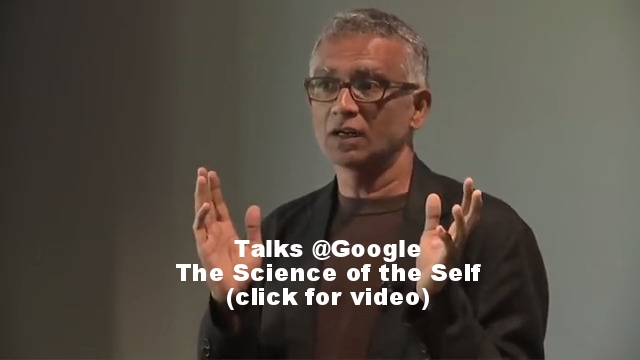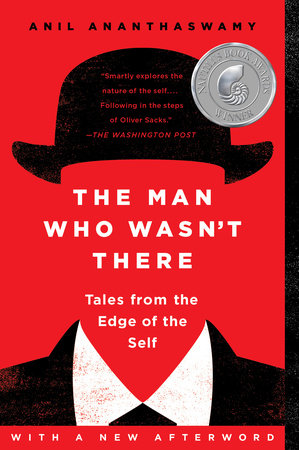
THE MAN WHO WASN’T THERE
Publishing details
Publisher: Dutton (Penguin Random House, USA)
Overview
An intimate look at the latest neuroscience of schizophrenia, autism, Alzheimer’s disease, ecstatic epilepsy, Cotard’s syndrome, out-of-body experiences, and other conditions—revealing the awesome power of the human sense of self.
Extensive in-depth interviews venture into the lives of individuals who offer perspectives that will change how you think about who you are. These individuals all lost some part of what we think of as our self, but they then offer remarkable, sometimes heart-wrenching insights into what remains. One man cut off his own leg. Another became one with the universe.
We are learning about the self at a level of detail that Descartes (“I think therefore I am”) could never have imagined. Recent research into Alzheimer’s illuminates how memory creates your narrative self by using the same part of your brain for your past as for your future. But wait, those afflicted with Cotard’s syndrome think they are already dead; in a way, they believe that “I think therefore I am not.” Who—or what—can say that? Neuroscience has identified specific regions of the brain that, when they misfire, can cause the self to move back and forth between the body and a doppelgänger, or to leave the body entirely. So where in the brain, or mind, or body, is the self actually located? Neuroscientists themselves now see that the elusive sense of self is both everywhere and nowhere in the human brain.
Praise/reviews
“The gallery of personal, often tender, portraits of patients is impressive and reminiscent of the writings of Oliver Sacks… A skilled science journalist, Ananthaswamy excels at making theoretical concepts and experimental procedures both comprehensible and compelling.”
—Science
“Autobiographies hinging on conditions such as Asperger’s syndrome and schizophrenia are proliferating, but there is little to fill the void between such accounts and the scientific literature. Linking experiences with experiments, and individuals with numbers, Ananthaswamy bridges that gap convincingly.”
—Nature
“In The Man Who Wasn’t There, science writer Anil Ananthaswamy smartly explores the nature of the self by way of several mental conditions that eat away at patients’ identities… Following in the steps of Oliver Sacks’s “The Man Who Mistook His Wife for a Hat” (1985) and V. S. Ramachandran and Sandra Blakeslee’s “Phantoms in the Brain” (1999), Ananthaswamy uses neuropsychology and narrative to take us inside the heads of people experiencing realities very different from our own.”
—Washington Post
“An agreeably written travelogue through this mysterious landscape at the frontiers of knowledge.”
—The Wall Street Journal
“It is an astonishing journey and an ambitious book, bringing together cutting-edge science and philosophy from West and East. You will not be quite the same self after reading it.”
—New Scientist
“You’ll never see yourself—or others—the same way again.”
—People
“Anil Ananthaswamy’s exploration of the human ‘self’ is a blazingly original excursion through the brain—as well as a fascinating catalog of bizarre disorders.”
—Entertainment Weekly
“When you think ‘beach read,” you probably don’t think “neuroscience.” But science journalist Ananthaswamy has a knack for making difficult topics accessible to everyone.”
—Men’s Journal
“[The Man Who Wasn’t There] illuminates some of the most provocative questions at the boundary of science and philosophy.”
—Columbus Dispatch
“Science journalist Ananthaswamy skillfully inspects the bewildering connections among brain, body, mind, self, and society… Readers will be fascinated by Ananthaswamy’s chronicles as he explores, with kindness and keen intelligence, the uncomfortable aberrations that reveal what it is to be human.”
—Publishers Weekly (starred review)
“A compelling and entertaining look at the last untapped mystery, the true final frontier: the nature of our selves. Science journalism at its best.”
—Daniel J. Levitin, Professor of Psychology and Behavioural Neuroscience at McGill University, author of The Organized Mind and This Is Your Brain on Music
“Stunning… poetic and incisive. Each of the patients is unique, special and incredible in revealing something special about the mind, whether healthy or fragile. Ananthaswamy discovers the elusive nature of the very idea of self and makes sense out of it. It is a remarkable achievement.”
—Michael Gazzaniga, Director of the SAGE center for the study of the mind at UC Santa Barbara, author of Who’s in Charge? and Tales from Both Sides of the Brain
“Ananthaswamy’s remarkable achievement is to make sense of these unhappy individuals’ otherness, while holding on to their human sameness. You’ll come away enlightened and chastened, asking searching questions about who you are.”
—Nicholas Humphrey, Cambridge University, author of A History of the Mind
“Like Oliver Sacks, Ananthaswamy brings both erudition and sensitivity to his narrative so that we learn as much, and maybe more, from his subjects as we do from the scientists we meet along the way…. You’ll emerge with renewed wonder about the simple experience of being you.”
—Anil Seth, co-director of Sackler Centre for Consciousness Science, University of Sussex, and Editor-in-Chief, Neuroscience of Consciousness
“A wide range of engrossing (and many just plain weird) stories elegantly weaving together insights from psychology, psychiatry, and neuroscience. An informative, exciting, and slightly creepy tour of some profound questions about human nature.”
—David Poeppel, Director, Max-Planck Institute and Professor of Psychology and Neural Science, NYU
“In this lucid and personable analysis by Ananthaswamy, the self appears an illusion, which nevertheless feels very real to most of us. Since no organism can do without this mental anchor, nature has found a way to concoct one for us.”
—Frans de Waal, primatologist, Emory University and author of The Bonobo and The Atheist



